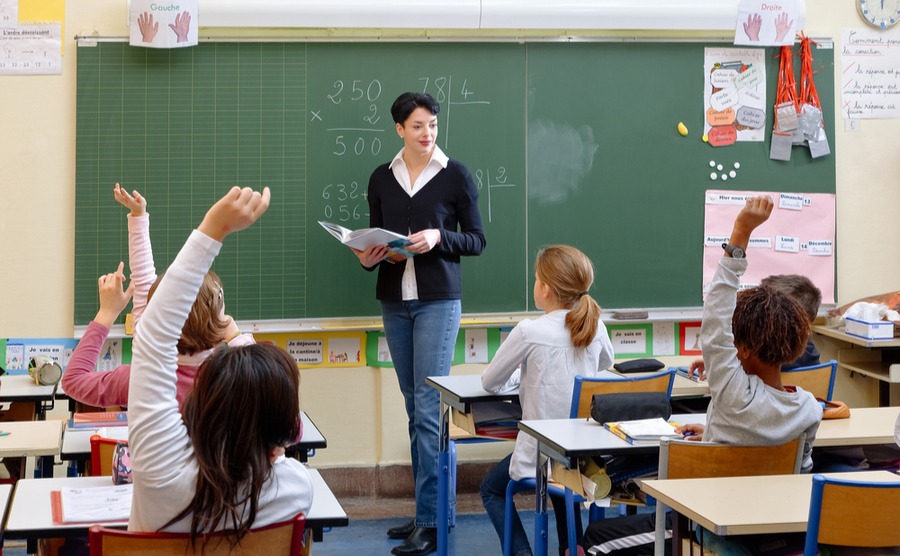Karen and her husband swapped the hustle and bustle of UK city living for the peace and quiet of the Charente, France. With two daughters born and raised in France, she’s an old hand at parenting à la française. We spoke to her about schooling, learning the language and the active childhood they’ve enjoyed in the French countryside.
We understand you’ve been living for a number of years now in the beautiful Charente, in southwestern France, and have raised your family there.
Yes, we live in a small village about an hour from Bordeaux, near Aubeterre-sur-Dronne. There’s me, my husband and the two girls, both of whom were born here.

Children in France generally enjoy more freedom and a more active childhood back in the UK, thanks to the better weather, more open space and strong community spirit.
A lot of families move for a better quality of life – more space, less rush, greater safety – but some do worry about the children, especially as they approach the teenage years, lacking in things to do. How has your experience been raising your family in France?
It’s absolutely a huge improvement. You might not think it living in a quiet village, but the girls always have plenty of activities on. They go to the cinema, they go to the river beach in Aubeterre in the summer. They’re definitely outside a lot more than they would be back in the UK.
Find homes in Charente via our property portal.
If you’re going to buy within the next twelve months, don’t miss your free tickets to Your Overseas Home. It’s designed specifically for serious buyers, so you can get detailed information from lawyers, agents and currency providers.
We have these fantastic institutions here called centre de loisirs, essentially leisure centres but completely government-funded. You can find every activity under the sun here, entirely for free. Even if your children are attending an international school, it’s a great way for them to mix with local children and get more involved in the community.
Life here is absolutely a huge improvement. The girls have plenty of activities on.
It feels so much safer than, for example, London. The sense of community here is very strong. The children can happily wander around the weekly market while I’m looking at a different stall. If I can’t make a school pick-up because I’m working, for instance, someone else can pick them up and take them to a café where we know the owner and they can have a chocolat chaud (always a chocolat chaud!) while they wait for me. Children have a lot more freedom here.
Some people do worry about putting their children through the French education system. How have your children (and you and your husband) found it?
As I said, both children were born here. They’ve always been in the French system, from nursery to primary school and now to collège, where they both are. It’s a private school, but it’s still actually government funded, so we only pay around €100 a month.

The children enjoy plenty of activities and trips in the French school system.
School here is a lot stricter on discipline and absences; students stand up when the teacher comes in, like it used to be in the UK. The schooldays are long – we’re out of the door well before 8:00am – but they have the bonus of no classes on Wednesday afternoon, which is when the activities happen.
People think the French system’s entirely academic, but that’s not really true. They have school trips regularly, art classes, all sorts of animations.
Has it ever been difficult bringing them up to be bilingual?
No, when they started in primary school at age six, the Headmaster was very clear. He said, ‘This year is for French and then English after’. They spent that first year learning to read and write only French, and then I helped to teach them to read and write English the year after that. That way, they didn’t get confused. We like to read books in English and use websites like ReadingEggs.com. It’s brilliant because that way they can follow a programme and keep progressing.
Why not spread the cost and buy a home together with parents or grandparents? Read our guide, Buying with Family
We speak English at home and French everywhere else, and it’s interesting that they’ve known since a young age the difference between when to speak English and French. They know to speak English to me and say ‘hello’ when I pick them up, but then when they get in a car with a friend, it’s straightaway ‘bonjour’ and ‘au revoir’.
If you’re dreaming of a new life in France for your family, this is the perfect time of the year to start planning, with the whole summer holidays ahead of you before the start of the new school year. Download your free France Buying Guide below to find out about the purchase process in France, as well as legalities, taxes, currency exchange and settling in.

Buying a property in France is extremely exciting, but it can be nerve-wracking: in what ways is the process different to the UK, how do you cope with the language difference, what fees should you expect and just who is the notaire? That’s why we’ve put together our France Buying Guide, to help you through the process, step by step.
Written by experts, it covers every stage of buying, from viewing to contracts and fees. Get your copy of the French Property Guide by simply filling in the form below.









